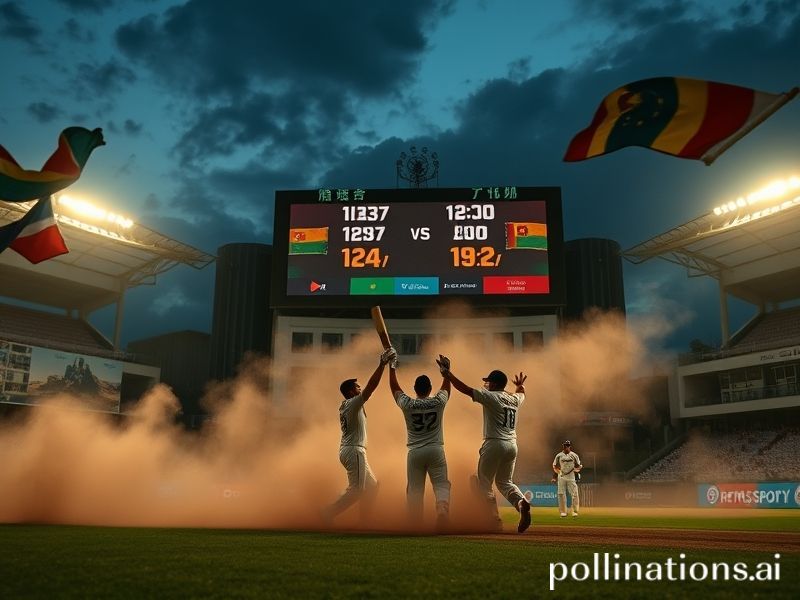Desert Dispatch: Hong Kong vs Sri Lanka Ends 167-162, World Barely Shrugs
Dubai, 6 March – Somewhere between the opulent skyscrapers of the UAE and the 24-hour news cycle that still pretends to care about associate-nation cricket, Hong Kong and Sri Lanka played what the ICC politely calls an “official T20I.” The rest of the planet, busy doom-scrolling about inflation or the latest palace intrigue in Washington, missed it entirely. Their loss: the scorecard reads like a haiku of late-capitalist sport.
Hong Kong 162/5 (20 overs)
Sri Lanka 167/3 (18.3 overs)
Result: Sri Lanka win by seven wickets, sparing the universe the indignity of an upset that would have trended for exactly eleven minutes on Twitter.
Global Context, or How We Got Here
In a saner world, a semi-autonomous Chinese territory with exactly four turf wickets would not be scrapping with a bankrupt island nation that once exported tea, terrorism, and off-spin in equal measure. Yet here we are: Hong Kong, ranked 23rd, flew in a squad of bankers, teachers, and one actual professional cricketer on leave from the Big Bash. Sri Lanka, meanwhile, arrived with a squad so injury-ravaged they considered drafting the airport janitor if he could turn it off the straight. Both teams were playing less for national glory than for ranking points that might, in some convoluted future, allow them to lose to India on a bigger stage.
The Match, Condensed for Anyone Still Reading
Hong Kong batted first, a decision made by a coin toss so old it featured the late Queen’s profile. Opener Nizakat Khan slashed 81 off 48 balls, a knock that would have been heroic had anyone outside Mong Kok been watching. Sri Lanka’s bowlers, apparently paid in rupees currently worth less than the sand on Dubai’s infield, responded with the enthusiasm of civil servants on a half-day. Hong Kong stumbled to 162; respectable, like a participation trophy redesigned by a minimalist.
The chase was clinical, which is journalist-speak for “boring but efficient.” Pathum Nissanka finished 62* with the serenity of a man who knows his government may default tomorrow, but tonight the fridge has beer. Wanindu Hasaranga chipped in with a cameo so brief it felt like a cameo in his own life. Sri Lanka crossed the line with nine balls to spare, prompting the emirate’s sprinklers to switch on—an automated reminder that even victory is temporary when the desert owns the deed.
Worldwide Implications, If We’re Being Dramatic
For Hong Kong, defeat confirms what every expat barfly already knows: the city-state excels at commerce, not cover drives. For Sri Lanka, victory merely delays existential questions such as “Who funds the next flight?” and “Will the board pay the Wi-Fi bill?” The ICC will log the match, feed the algorithm, and schedule another round of fixtures in a country whose stadiums double as refugee camps when tournaments leave town.
Meanwhile, the geopolitical scorecard ticks over: China absorbs Hong Kong’s cricket budget into a Belt-and-Road stadium nobody asked for; the IMF reminds Sri Lanka that interest compounds faster than a leg-spinner. Somewhere in London, a former colonial administrator sips single malt and mutters, “We really should have taught them baseball.”
Conclusion, Because Even Cynics Need Closure
The game ended, the sprinklers hissed, and the desert reclaimed its silence. In the record books, it goes down as Sri Lanka 2, Hong Kong 0, NRR +0.847. In the broader ledger of human folly, it registers as two island nations—one technically a peninsula—chasing leather under floodlights powered by fossil fuels and denial. The universe neither notices nor cares, but tomorrow the same flights will depart, the same ranking tables will update, and the same weary players will queue at immigration, passports dog-eared by hope.
Cricket, they say, is a metaphor for life. If so, tonight’s match reminded us that life occasionally hands you a moral victory, then schedules the next flight before you’ve cleared customs.







